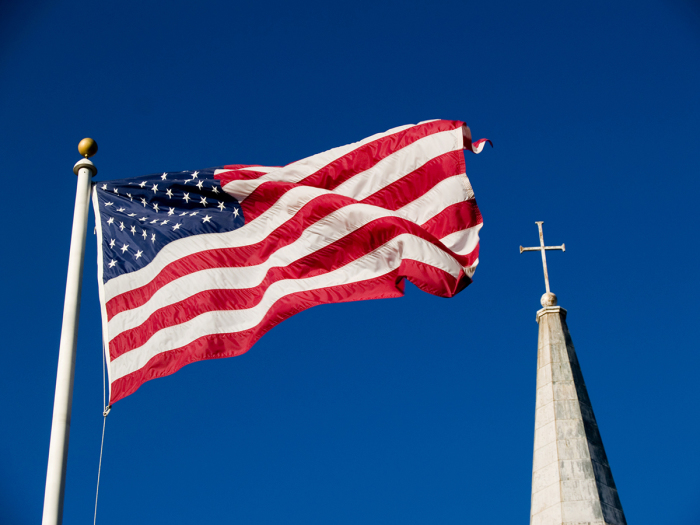
The United States has a significantly more favorable view of the Bible and Christianity than other countries that comprise the notoriously secular parts of the world, according to a new report.
The American Bible Society has released the second chapter of its State of the Bible: USA 2025 report. The information in the chapter, titled “The Bible Around the World,” is based on responses collected from 91,000 people in 85 countries as part of the Patmos World Attitudes Bible Survey. The survey was a collaborative effort between the American Bible Society and British and Foreign Bible Society.
The Patmos Survey divided the world into seven clusters. The research in the latest installment of the State of the Bible report focused primarily on Cluster 5. Labeled “the Secular West,” Cluster 5 includes the U.S., Canada, Western Europe as well as Australia and New Zealand.
The U.S. stands out as an outlier in “the Secular West,” which was given its label because of “growing secularization” that has “eroded the region’s historical commitment to Christianity.” When it comes to Bible use, which refers to engagement with the Bible outside of a church service or church event at least three to four times a year, the U.S. has a much higher share of respondents who use the Bible at least occasionally (63%).
Coming in second in Bible use among countries in “the Secular West” is Italy, where 50% use the Bible either “a few times a week or more,” “at least monthly” or “occasionally.”
Those who “never” use the Bible comprise the highest share of respondents in the Netherlands (64%), followed by France (63%), Australia (59%), the U.K. (56%), Canada (55%) and New Zealand (54%). Just 46% of respondents in Italy said they “never” use the Bible compared to 33% in the U.S.
The U.S. is also an outlier when it comes to the belief that “It’s difficult to trust the Bible because it clashes with the scientific worldview.” Forty-one percent of respondents based in the U.S. told pollsters they “disagree or strongly disagree” with this view. Disagreement with this perspective was significantly lower in Italy (26%), Canada (26%), Ireland (23%) and Sweden (13%).
The share of respondents who either agree or “strongly agree” that the Bible “clashes with the scientific worldview” was nearly identical in the U.S., (31%), and Italy (30%). It was higher in Canada (35%), Sweden (42%) and Ireland (45%).
The U.S. was also the only country where a majority see the Bible as “relevant to me personally” at 51%. Italy came in a distant second, with 37% of respondents from the European nation seeing the Bible as relevant in their personal lives. Ireland was closely divided on the matter, as 37% did not see the Bible as relevant to them, while 36% took the opposite view.
Pluralities of those living in France (40%), Spain (42%), Canada (43%), Slovenia (44%), New Zealand (46%), the U.K. (48%) and Australia (49%) disagreed that the Bible was relevant to them personally, as did exactly one-half of respondents in Austria and Belgium. A majority of those in Germany (53%), Switzerland (53%), the Netherlands (57%), Norway (58%) and Sweden (59%) had the same view.
In some cases, the U.S. was eclipsed by Italy when it came to positive views about the Bible and a rejection of negative views about it. When asked if the Bible was “a source of harm in the world,” a significant majority of Italians (65%) “strongly disagreed” or “disagreed” with the statement along with a smaller majority of Americans (55%). Less than half of those living in Canada (45%), Ireland (42%) and Sweden (29%) rejected the characterization of the Bible as harmful.
When it comes to church attendance, Ireland and Italy lead the pack among the “Secular West,” with 62% and 61% of respondents, respectively, going to church at least “occasionally.” The U.S. is not far behind, with 57% going to church either “weekly or more,” “at least monthly” or “occasionally.” By contrast, majorities of respondents in France (57%), Canada (59%), New Zealand (60%), the U.K. (60%), the Netherlands (61%) and Australia (64%) “never” go to church.
John Farquhar Plake, chief innovation officer at ABS and editor-in-chief of the State of the Bible series, said in a statement released Wednesday that the findings gave an “unprecedented” view on religious practices.
“These insights, made possible by invaluable contributions and expertise among our partner organizations, give us an unprecedented view of worldwide attitudes toward and engagement with the Bible,” Plake said.
“This study helps us see where God’s Word is spreading and his church is growing. We also see vast opportunities to share his Word with the world.”
Ryan Foley is a reporter for The Christian Post. He can be reached at: ryan.foley@christianpost.com
















